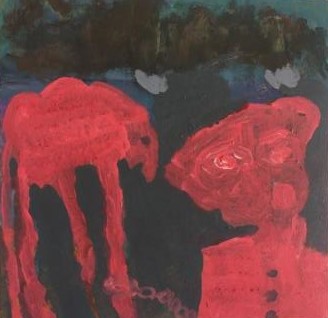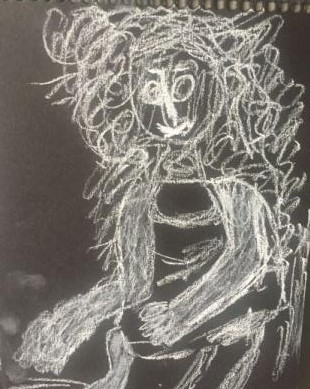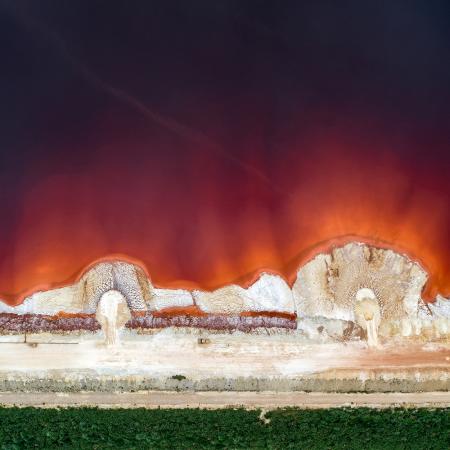"The Situation" II - Latakia
There remains only one solution: to ignore the virus.
Khaled Khalifa was born in 1964 in a village close to Aleppo, Syria. He has written numerous screenplays and is the author of six novels, including In Praise of Hatred, which was short-listed for the International Prize for Arabic Fiction, No Knives in the Kitchens of This City, which won the Naguib Mahfouz Medal for Literature in 2013, and Death Is Hard Work, nominated, in Leri Price's translation, for the 2019 National Book Award.

Khaled Khalifa - red painting

Khaled Khalifa - chalk drawing
Every day I wake up alone in my home by the sea and wait for the end of the world. I won’t be too sad when the sea decides to pick up and leave, or when the trees pack their bags, the sun never to rise again. Every day I wake up and I think this, that the world must end, because it will not be any more human after the coronavirus pandemic is under control. On the contrary, it will be more savage. Those who fool themselves into thinking they are living simply because they’re not dead will feel a terrible hollowness.
I’ve experienced death every day for the past nine years. I’ve remained in Syria throughout the war, except for the little time I spent abroad in writing programs and at the few book signings of my novels I attended in other countries. Over the course of these nine years, we’ve learned the cruelest meanings of death, of hope, of waiting. But nothing happened. From the outside, the world was turning smoothly, normally, nothing disturbed its quiet mornings. Meanwhile in my country, death was literally never ending. We wished for a single day without bombs, without death, without arrests, but it was useless. The voice never came; no one ever asked us, “What do you want?” No one was able to answer the question of why it was happening, or whether it could have simply been prevented.
Today the whole world is shut down. We say goodbye to our loved ones everywhere on earth, in Italy and Syria and the United States. We say goodbye to our friends every moment, without having a single answer for dozens of questions. Whoever released this sick genie from his bottle has our blood on his hands. Today we share this disaster with the world, but here in Syria everything will pass without us knowing how many died from coronavirus. We don’t have a healthcare system that can ensure our safety or even conduct tests. There remains only one solution: to ignore the virus. Yes, this is what we do, we ignore the virus, with weak, ridiculous arguments. Those of us who survived the war don’t fear death by a silly little disease like corona. I spend my days alone. I search for T.S. Eliot’s texts in my own wasteland, I resurrect an old hobby, I paint.
Every day I paint a picture and I say to myself, why shouldn’t I? I’ll become a painter; I’ve written quite a lot. Six novels are plenty. I’ll leave a mark on the world before I go, and, if the virus doesn’t take me, I won’t fool myself into thinking I have lived.
Latakia, May 3rd, 2020
Translated from the Arabic by Kaylee Lockett
Spring 2020
Vol 10 No 3
"The Situation" - II
- Editorial
- Alice Yousef (Jerusalem)
- Minae Mizumura (Tokyo)
- Chandrahas Choudhury (New Delhi)
- Peter Kimani (Nairobi)
- Jacqueline Goldberg (Caracas)
- Andrea Hirata (Sumatra)
- Mabrouck Rachedi (Paris)
- Kavery Nambisan (Kodava)
- Ameena Hussein (Colombo)
- Helon Habila (Fairfax, VA)
- Amira Gehanne Khalfallah (Istanbul/Algiers)
- Marjan Strojan (Ljubljana)
- Med Magani (Algiers)
- Beaudelaine Pierre (Minneapolis/Port-au-Prince)
- Mohib Zegham (Kabul)
- Usha K R (Bengaluru)
- Nick Yu (Shanghai)
- Ksenia Dragunskaya (rural Russia)
- Haifa Abu-Al Nadi (Amman)
- Nikola Madzirov (Strumica)
- Soheil Najm (Baghdad)
- Antoinette Tidjani Alou (Paris/Niamey)
- Sabata-Mpho Mokae (Kimberley)
- Khaled Khalifa (Latakia)



